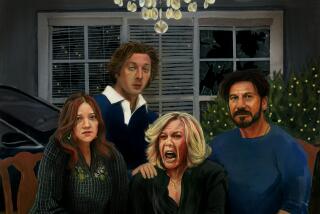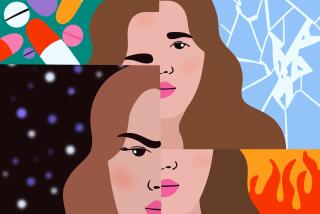‘You’re the Worst’ does what few other shows can - makes depression comprehensible
- Share via
Life’s little complications are the lifeblood of the FXX comedy series “You’re the Worst,” created by “Weeds” alum Stephen Falk.
The show follows four aimless thirtysomethings fumbling toward middle age as they squeeze every drop of fun out of their alcohol-soaked lives in Los Angeles. A delicately calibrated portrayal of messy, modern living, the series offers a window into a generation often misunderstood and gets at what’s driving an entire culture of aimlessness.
Adding to that, the gang lives in Los Angeles, which lends itself to endless in-jokes. When friends Jimmy (Chris Geere), Gretchen (Aya Cash), Edgar (Desmin Borges) and Lindsay (Kether Donahue) bet on the cause of a traffic snarl, answers vary from “It’s sprinkling” to “Obama is on Kimmel again” to “Elmo fight outside the Chinese Theater.” (Right answer: the L.A. Marathon.)
SIGN UP for the free Indie Focus movies newsletter >>
But what really sets the show apart is something that few other series have been able to do successfully: It tackles clinical depression in a comprehensible way.
Television has given more screen time than ever to matters of mental illness this season, from shows as diverse as “Homeland” and “Hannibal” to newcomers like “Mr. Robot” and “Unreal.” But “You’re the Worst” truly nails the balance required for discussing clinical depression.
“We called the depression the show’s fifth character,” says Geere, “because of the impact it has on everyone individually.”
The show, which was just picked up for a third season, follows a toxic yet magnetic couple as they try to figure out how and why they might make a relationship work. Cynic Gretchen and narcissist Jimmy, both awful people in their own right, are somehow less awful together.
Their relationship reads like the ugly back story that lurks behind the scenes of all great sitcom couples. It’s as if the pair are only a few years away from transforming into “Mad About You’s” Paul and Jamie Buchman and naming their baby Mabel and their dog Murray. Maybe the more repellent aspects of TV couples have been the most interesting parts of sitcom relationships all along.
“You’re the Worst,” which had its premiere in summer 2014, may not generate high ratings, but it’s critically acclaimed and resonates with a segment of the populace often dismissed as hipster millennials.
Well into the second season, which ends Wednesday, the show actively began developing a story line that showed romantic lead Gretchen struggling with depression. The reveal in the episode “There Is Not Currently a Problem” blindsided her boyfriend Jimmy and viewers alike. In the multi-episode arc that followed, Gretchen grew more mired in depression and Jimmy more stymied by his inability to help her.
It’s OK to be sad; you can feel that and deal with that, but sadness that’s incapacitating is not.
— Aya Cash’s Gretchen on ‘You’re the Worst’
The brilliance of this rarely told narrative is that it examines the idea that it’s impossible to know everything about someone. Then, there’s the thought that no one aspect of someone’s life defines them. People are a collection of foibles, a clutch of specifics that make up a beautiful whole.
“I don’t feel uncomfortable tackling anything,” Falk says. “Having worked with Jenji Kohan [creator of “Weeds” and “Orange Is the New Black”], she taught me not to fear writing that you don’t know first hand.”
But Cash didn’t always share Falk’s confidence about what darkness lurked behind the her character’s exterior.
“I had these moments of insecurity and worried that I wasn’t honoring something that I felt was very important,” Cash says, “and if I was honoring it, were people going to go with it or just be annoyed that their comedy had too much drama in it?”
Though valid concerns, part of the reason “You’re the Worst’s” examination of depression works so well is that it allows for every iteration of the illness, letting the humor of the situation to shine through when appropriate.
For all her concerns, however, and as much as the success of “You’re the Worst’s” depression arc depends on Cash’s performance, she wasn’t unprepared for the characterization.
“I tend to swing low. I’m familiar with that,” she says. “I am not clinically depressed, but I have experienced depression as an outsider, and I felt like I understood it on an emotional level.”
Beyond much-admired performances by Cash and Geere, “You’re the Worst’s” depression arc finds success the same way the series does everything else: through specificity.
“The thing that surprised me the most in researching clinical depression is how it manifests very, very differently in people,” Falk says. “Once we found that out there are a wide range of behaviors and symptoms and coping mechanisms, it gave us an extra shot to dramatize Gretchen’s depression in an interesting way.”
As for why Falk chose this moment to introduce the plot, he attributes it to wanting to subvert story expectations, opting to more deeply explore the complications that define the show.
When, at the end of Season 1, Jimmy and Gretchen moved in together, it was the beginning of a new stage in their relationship, just not the one they had anticipated. The expected struggles of how to share space or divide chores suddenly gave way to much more significant complications in Season 2.
“The secondary function of the depression has really served as a reminder of when you get into a relationship and you have to navigate ‘the thing,’ ” Falk says. “You have to deal with who you’re actually shacked up with now and what are you going to do then?”
That idea of “what now?” as it pertains to suddenly dealing with a partner who’s depressed is something Geere has thought about a lot.
“People’s natural instinct, not just Jimmy’s, is to run away because they’re out of their depths,” Geere says. “They don’t know what they’re doing.”
But lack of understanding is not necessarily lack of trying, Geere clarifies.
“Jimmy asks Gretchen to explain it to him,” he says. “Explain her depression and then maybe he can try and process it. But the truth is, Jimmy doesn’t get it.”
That a sense of confusion suffuses the conversation around mental illness, even within a person’s own head, is not lost on Cash.
“We don’t know what normal is anymore and what a normal level of sadness is,” she says. “It’s OK to be sad; you can feel that and deal with that, but sadness that’s incapacitating is not. It’s complicated.”
It is complicated. Aging is complicated. Depression is complicated. Relationships are complicated. And “You’re the Worst” understands that it’s those precise complications that are the conversations worth having.
For the series’ third season, Falk isn’t worried about getting pigeonholed by his story choices.
“We’re not just going to play the same note. We’re going to try to show a different side,” he says. “We’re going to turn the crystal and show a different way the light bounces off that character.”
And complications will ensue.
-----------------------
‘You’re the Worst’
Where: FXX
When: 10:45 p.m. Wednesday
Rating: TV-MA (may be unsuitable for children under the age of 17)
More to Read
The complete guide to home viewing
Get Screen Gab for everything about the TV shows and streaming movies everyone’s talking about.
You may occasionally receive promotional content from the Los Angeles Times.







